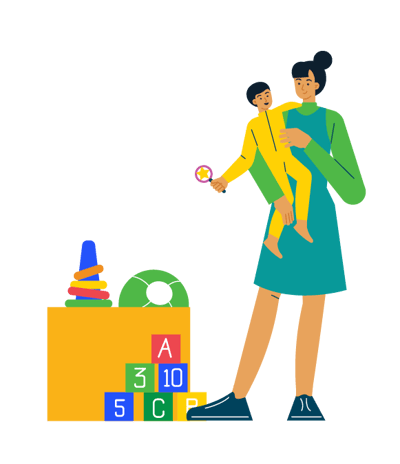This page highlights some of the supports available for the families of children who have been diagnosed with a disability or developmental delay. There are a range of supports available in early education and schools, school transport, health supports, housing grants and income supports.

Health
- GPs offer free developmental examinations in the weeks following a baby’s birth.
- Public health nurses also monitor the development of a baby and provides information and support to parents.
- Children who have mild or moderate difficulties may be referred to health professionals in their local primary care services by a nurse or GP.
- You can find out about these services at your local health centre.
- Children may be referred to a Children’s Disability Network Team (CDNT) by either a parent or health and social care professional.
- The CDNT is a team of professionals with expertise in disability who work closely together in areas such as psychology, nursing, occupational therapy, paediatrics, physiotherapy, social work, and speech and language therapy.
- If your child has not been diagnosed but you think they may have a disability, you can apply for an Assessment of Need by the HSE to help identify your child’s health and education needs.
- Your child may be eligible for a medical card or GP visit card subject to certain criteria.
- A child that has a condition covered by the Long Term Illness Scheme is entitled to free medicines and appliances for the treatment of that condition.
Income Supports
-
The Department of Social Protection provides the main income supports and payments for carers and people with disabilities.
-
Carer’s Allowance and Carer’s Benefit are the main payments for those providing full-time care.
-
If you get Carer’s Allowance, you are entitled to a free travel pass.
-
Carers may also qualify for an annual Carer’s Support Grant.
-
If you receive other social welfare payments, you may be able to keep your main social welfare payment and get half-rate Carer’s Allowance
in addition. -
The Domiciliary Care Allowance is a monthly payment made to the carer of a child with a severe disability who lives at home.
-
All children receiving Domiciliary Care Allowance are eligible for a medical card without a means test.
-
The Homemaker’s Scheme is also available if you have given up work to take care of an incapacitated child.
-
When your child reaches the age of 16, they may qualify for Disability Allowance.

![iStock-1328684915 [Converted] iStock-1328684915 [Converted]](https://www.fiannafail.ie/hs-fs/hubfs/iStock-1328684915%20%5BConverted%5D.png?width=1786&height=2000&name=iStock-1328684915%20%5BConverted%5D.png)
Primary & second-level education
- Special education teachers and special needs assistants provide additional support for students with special educational needs in mainstream primary and secondary schools.
- Additional teaching and other resources are available through Special Educational Needs Organisers.
- The Visiting Teacher Service supports families and children who are deaf/hard of hearing or
blind/visually impaired. - The Home Tuition Scheme provides funding to parents to provide education at home for children who are awaiting a suitable educational placement.
- The Summer Programme is available in all schools to extend their education services during the summer holiday period for children with a disability.
- A home-based Summer Programme is available
to certain children if their school is not participating in the Summer Programme
or cannot offer them a place. - The Irish Sign Language (ISL) scheme is available to children who are deaf/hard of hearing and whose main means of communication is using ISL.
- Special classes for pupils with specific speech
and language disorder are attached to mainstream primary schools and available to students who meet specific criteria. - There are special reading schools, and special classes attached to some mainstream primary schools, which support the needs of children
with dyslexia. - There are special schools, and special classes attached to some mainstream schools, for students with a hearing impairment.
Tax credits & reliefs
- Health expenses can be claimed through the Medical Expenses Tax Relief.
- These can be your own health expenses, those of a family member or any individual’s, as long as you paid for them.
- VAT refunds are available on certain aids and appliances.
- The Incapacitated Child Tax Credit is available to the parents/guardians of a child who is permanently incapacitated.
- The Dependent Relative Tax Credit is a tax credit that parents/guardians and people caring for dependent relatives may claim.
- Trust funds that benefit people who are permanently incapacitated may be exempt from income tax.
- Tax relief is available on the cost of employing a carer for either yourself or for another family member.
- Tax relief is available for those who have an assistance dog.
- The Disabled Drivers and Disabled Passengers Scheme provides a range of tax reliefs for disabled drivers and disabled passengers.
- The Home Carer Tax Credit is available married couples and those in a civil partnership if they care for a dependent person.
![iStock-842810956 [Converted] iStock-842810956 [Converted]](https://www.fiannafail.ie/hubfs/iStock-842810956%20%5BConverted%5D.png)
![iStock-477459321 [Converted] iStock-477459321 [Converted]](https://www.fiannafail.ie/hs-fs/hubfs/iStock-477459321%20%5BConverted%5D.png?width=2000&height=831&name=iStock-477459321%20%5BConverted%5D.png)
School transport
- The School Transport Scheme applies to children with special educational needs recognised by the Department of Education.
- Eligible children do not pay a charge for school transport.
- Where transport cannot be provided, children may be eligible for a Special Transport Grant to help with the cost of making private transport arrangements.
Early years
- All children are entitled to two year’s free pre-school education and early childhood care under the Early Childhood Care and Education Scheme.
- Some specialised pre-school services may be available in your area, such as the Access and Inclusion Model, and many pre-schools have staff who are trained to work with children with special needs.
- Applications for targeted supports are made by the pre-school provider in collaboration parents.
- Children with a disability are entitled to an Assessment of Need of education supports and services to determine their requirements.
![iStock-636886734 [Converted] iStock-636886734 [Converted]](https://www.fiannafail.ie/hs-fs/hubfs/iStock-636886734%20%5BConverted%5D.png?width=1800&height=1318&name=iStock-636886734%20%5BConverted%5D.png)
![iStock-1156455007 [Converted] iStock-1156455007 [Converted]](https://www.fiannafail.ie/hs-fs/hubfs/iStock-1156455007%20%5BConverted%5D.png?width=2000&height=1412&name=iStock-1156455007%20%5BConverted%5D.png)
Housing
-
The Housing Adaptation Grant is available for those with a physical, sensory, mental health or intellectual disability that enables an improvement in how they enter and move around the home.
-
The Mobility Aids Grant Scheme is also available for minor adaptations of a house.